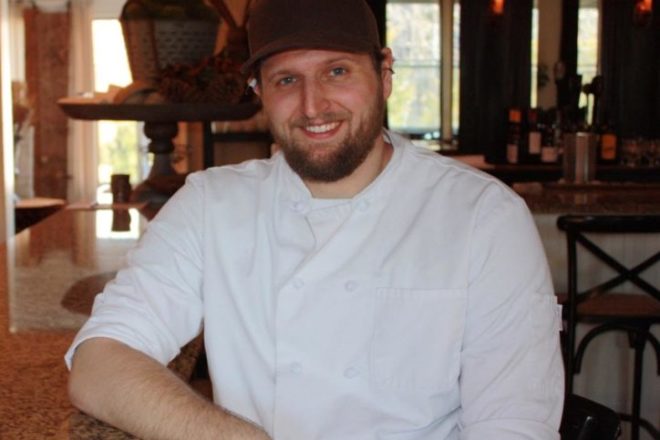Sit-Down With a Chef: Ryan Klawitter on Door County’s Farms and Forks
- Share
- Tweet
- Pin
- Share

Ryan Klawitter was hardly through the door of the coffee shop before the person behind the counter was talking excitedly to him about ceramic egg poachers. His eyes lit up. “You can also do it with plastic wrap twisted into a cup of hot water,” he offered.
Door County’s food scene has taken huge strides in the past six years. Those who have been in Door County over the past decade have witnessed a rapid increase of restaurants and farms that cherish food and the way it is made. Now, visitors and locals alike enjoy the offerings of these businesses, which include a goat creamery, numerous small organic farms, craft coffee shops, and a prohibition-style farm-to-fork restaurant whose cocktails got a write-up in the New York Times.
Along with those restaurants and farms come food workers like Klawitter, Chef de Cuisine at Wickman House in Ellison Bay.
Klawitter got his start in Madison, working the line with a friend and getting their “asses handed to us every day.” After moving to Door County in 2013, Klawitter got a job helping out at Wickman House, then spent two years as executive chef at the Whistling Swan in Fish Creek before returning to Wickman House this season.
It was at the Swan that Klawitter was able to get in touch with the Door County food scene. Casual Tuesdays menus over the winter months cooked for the more curious palate gave the Whistling Swan kitchen the opportunity to get creative and work beyond the bounds of their regular menu.
“[The food scene in Door County is] contrary to what people are used to seeing in a local food scene,” explains Klawitter, mentioning how the tourist season, which pushes kitchen workers to reinvent classic dishes, is offset by a different crowd in the winter. “I had a lady last season ask me what caramelized onions were. Caramelized onions!…[But] how many good people are here year-round that want to eat good food year round? That’s exciting to me.”
When asked about how to bridge the gap between these two audiences, Klawitter was convinced that the chef’s job is to find ways to express their philosophy about food within the constraints of what you know your customers want to eat.
“It’s up to [the chef to show] why local food is special…As farm-to-table begins to permeate more and more into our lives, people will begin to understand more and more.”
Central to this emphasis on food source is a great respect for those who dedicate their lives to producing it. Farm-to-fork, or farm-to-table, emphasizes direct business relationships between the people that grow food and the people that prepare it in the interest of procuring the freshest ingredients available and also to be more involved in the world of food production.
Klawitter cites an opportunity to take part in the slaughtering of a pig 10 years ago as very influential for him.
“We wanted to know what it was like, start to finish,” said Klawitter, who, along with a group of fellow chefs, chose to dispatch the hog in the traditional way (that is, without a pistol). “It was a humbling experience…We made damn sure we didn’t waste anything from that pig.”
As part of using the whole animal, they made broth from all of the bones as well as headcheese from the brain.
That experience has stuck with him. Klawitter could not sing the praises of Door County farmers more.
“The fact that farmers here are growing food with this much topsoil – and growing food well – I think that’s an amazing feat.”
It is not only clear that chefs like Klawitter are cooking, not just to feed people, but for the love of the ingredients which define their craft and, ultimately, connect us all; but also that Klawitter is not alone in his inspirations up here, away from the cities, away from the hustle and the bustle, making our quiet home a little more enticing.

